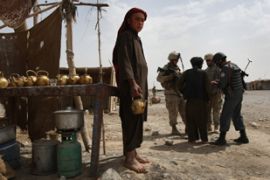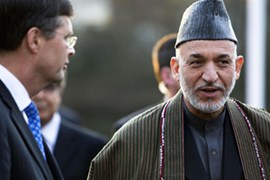Clinton backs talks with Taliban
Conference encourages reconciliation as US prepares extra troops for Afghanistan.

‘Cordial exchange’
The US envoy to Afghanistan held “a cordial exchange” with Iran’s deputy foreign minister, Clinton said on Tuesday.
 |
| Karzai urged Afghanistan’s allies to invest in his country’s security forces [AFP] |
The meeting between Richard Holbrooke and Mohammad Mehdi Akhoundzade took place on the sidelines of the talks.
It is the highest level contact between the two nations since the Iranian Revolution 30 years ago.
Addressing the delegates, Hamid Karzai, the Afghan president, reiterated his intention to talk to former Taliban members.
“We must spare no effort to bring back to Afghanistan and to normal life all those from the ranks of the Taliban who have no association with al-Qaeda and are willing to embrace peace and accept the constitution,” he said.
Al Jazeera’s James Bays, reporting from the conference, said: “This is not the first time this has been discussed and we know that some talks have already gone on behind the scenes in recent weeks and months.”
‘Best recruiting tool’
In her speech, Clinton said that Afghanistan needed to address corruption.
Transparency International, an international organisation which monitors official corruption, says Afghanistan is perceived as one of the most corrupt countries in the world.
“Corruption is a cancer as dangerous to long-term success as the Taliban or al-Qaeda. A government that cannot deliver accountable services for its people is a terrorist’s best recruiting tool,” Clinton said.
She also urged Afghanistan’s neighbours to work to stem the flow of drugs from Afghanistan, which is the source of 90 per cent of the world’s heroin.
This prompted rare agreement from Iran, which has not had diplomatic relations with Washington for nearly 30 years.
“Iran is fully prepared to participate in the projects aimed at combating drug trafficking and the plans in line with developing and reconstructing Afghanistan,” Akhoundzade said.
However, Iran did voice objections to US plans to send an extra 17,000 US soldiers and 4,000 advisers to train Afghan forces, plus hundreds more civilians to work on development issues.
“The presence of foreign troops cannot bring peace and stability for Afghanistan,” Akhoundzade said, underscoring the need for a regional solution instead.
Karzai, though, urged other allies to invest in the development of his national security forces to help combat the threat of violence.
“Building up the Afghan security capacity will be the surest, most sustainable and least costly way to overcome the threat of terrorism, provide security and law and order to the people of Afghanistan,” he said.
Pakistan ‘sanctuary’
In his speech, Karzai also alluded to the sanctuary found by the Taliban and al-Qaeda in the tribal belt of neighbouring Pakistan.
“The Afghan people also expect that any military scale-up will be used effectively to protect civilian lives and to stem the infiltration of terrorists from across Afghanistan’s borders,” he said.
 |
| Mullen identified ‘insurgency, instability and insecurity’ as Afghanistan’s problems [EPA] |
Those concerns were addressed by Admiral Michael Mullen, the chairman of the US joint chiefs of staff, in an interview with Al Jazeera. He said that the US “strategy now focuses not just on Afghanistan … it must focus on Pakistan and Afghanistan”.
“We’ve got to turn that around as the first step in terms of being able to enable better government, to enable a better economy so that the Afghan people can be secure in their future,” he said.
Admitting that there was “no end date to the Afghan mission”, Mullen said that while there is a democratically elected government in Afghanistan, “insurgency, instability and insecurity” had to be dealt with.
Amid the developments at a diplomatic level, the International Committee of the Red Cross cautioned that the planned increase in military operations in Afghanistan is likely to mean more civilian casualties.
The aid group urged the conference to “consider the plight of civilians as a matter of urgency”.
Separately, Amnesty International (AI), the human-rights group, called for steps to be taken to improve conditions for Afghans.
“The Afghan people deserve and demand performance, not promises, from their government and its international supporters, chief among them the United States,” Sam Zarifi, director of AI’s Asia-Pacific programme, said.